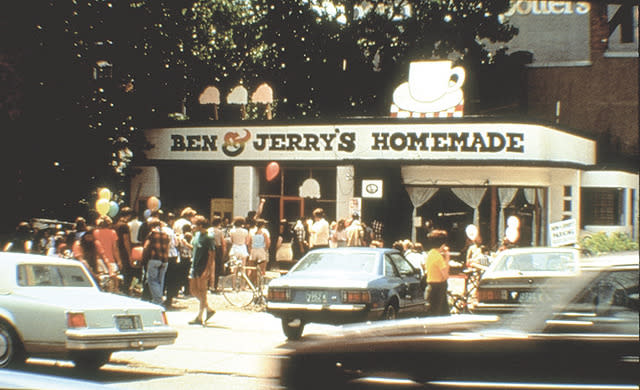Ben and Jerry’s Ice Cream Company Posts about Land Back, Sparks Outrage

On July Fourth, the popular ice cream company Ben and Jerry’s posted on Twitter a land back post advocating for stolen U.S. land to be returned to Native communities.
The post that reads “This 4th of July, it's high time we recognize that the US exists on stolen Indigenous land and commit to returning it,” was accompanied by a link that takes you to the company's website where they have more information about the land back movement.
This post has since sparked outrage from many Americans.
Specifically, the company is advocating for the return of Mount Rushmore to the Lakota. Before it was Mount Rushmore, the mountainside was called Tunkasila Sakpe by the Lakota Sioux that resided in the Black Hills.
“Long before South Dakota had become a state, long before the faces of four American presidents were blasted into the side of Mount Rushmore, that mountain was known as Tunkasila Sakpe, the Six Grandfathers, to the Lakota Sioux—a holy mountain that rises up from the Black Hills, land they consider sacred,” Ben and Jerry’s explain on their website.
After gold was discovered in the area, settlers rushed to the Black Hills and the Lakota Sioux were forced to move even after Federal-Tribal treaties were signed. The company notes also that in 1980, the Supreme Court ruled that the land was stolen and awarded financial compensation. The tribes refused and were only accepting the return of the land.
The social media post has received thousands of replies on Twitter attacking the company. Many of the comments refer to anti-Indigenous stereotypes and many call for a boycott of the brand.
South Dakota Governor Kristi Noem (R) took to Fox News to share her opinion on the matter, calling Mount Rushmore “the greatest symbol of our [United States] freedom”.
She stated she will not be listening to “a bunch of liberal Vermont businessmen who think they know everything about this country and haven’t studied our history,” and “we should be proud of America and knock off what Ben & Jerry’s is doing. They don’t have any idea what they’re doing.”
Ben and Jerry's is a wholly-owned independent subsidiary of British multinational corporation Unilever.
Ben and Jerry’s also advocated for the public to sign the Lakota People’s Law Project petition that advocates for Mount Rushmore to be returned to the Lakota.
While others are starting to boycott the brand, the Lakota People’s Law Project are grateful for the company's amplification of their message.
“[T]oday we send our deep appreciation to Ben & Jerry’s and to you for helping us make a difference in the world. Let’s keep the discussion going and the pressure on. I pray that, one fine day, the Black Hills will be back where they belong: in Indigenous care!” said Tokata Iron Eyes, Lakota People’s Law Project Organizer, in a statement.
Don Stevens, chief of the Nulhegan Band of The Coosuk Abenaki Nation, told Newsweek they have always been interested in having land returned to them, although Ben and Jerry’s has never reached out to discuss this.
Maps show that the Abenaki had historic residences in an area that stretches from the northern border of Massachusetts to New Brunswick, Canada, and from the St. Lawrence River to the East Coast. Ben and Jerry’s headquarters are located in southern Burlington, which are within this historic Abenaki territory, although it is not located within modern-day tribal territories.
"We are always interested in reclaiming the stewardship of our lands throughout our traditional territories and providing opportunities to uplift our communities," Stevens told Newsweek. “If and when we are approached, many conversations and discussions will need to take place to determine the best path forward for all involved."
Ben and Jerry’s was sold to Unilever in 2000, joining other brands like Dove, Hellmann’s, Magnum, and Lipton–none of which have made land back statements. The corporation is rooted in the slave trade of Central and West Africa, among other places, including Lever’s Pacific Plantations Limited in the Solomon Islands and Huileries du Congo Belge in the Congo. Unilever currently has a 15-page Modern Slavery Statement that was created in 2022, where they list the risks of modern slavery in countries across the globe where their holdings are located and the steps they’re taking to address it.
Native News Online found no evidence that Unilever or its subsidiaries have returned any land to tribal communities.
At press time, neither Ben and Jerry’s nor Unilever have responded to Native News Online’s requests for comment made by email and phone.
This article has been updated to include comments Don Stevens, chief of the Nulhegan Band of The Coosuk Abenaki Nation, made to Newsweek.
About the Author: "Neely Bardwell (descendant of the Little Traverse Bay Bands of Odawa Indian) is a staff reporter for Native News Online. Bardwell is also a student at Michigan State University where she is majoring in policy and minoring in Native American studies. "
Contact: neely@nativenewsonline.net

